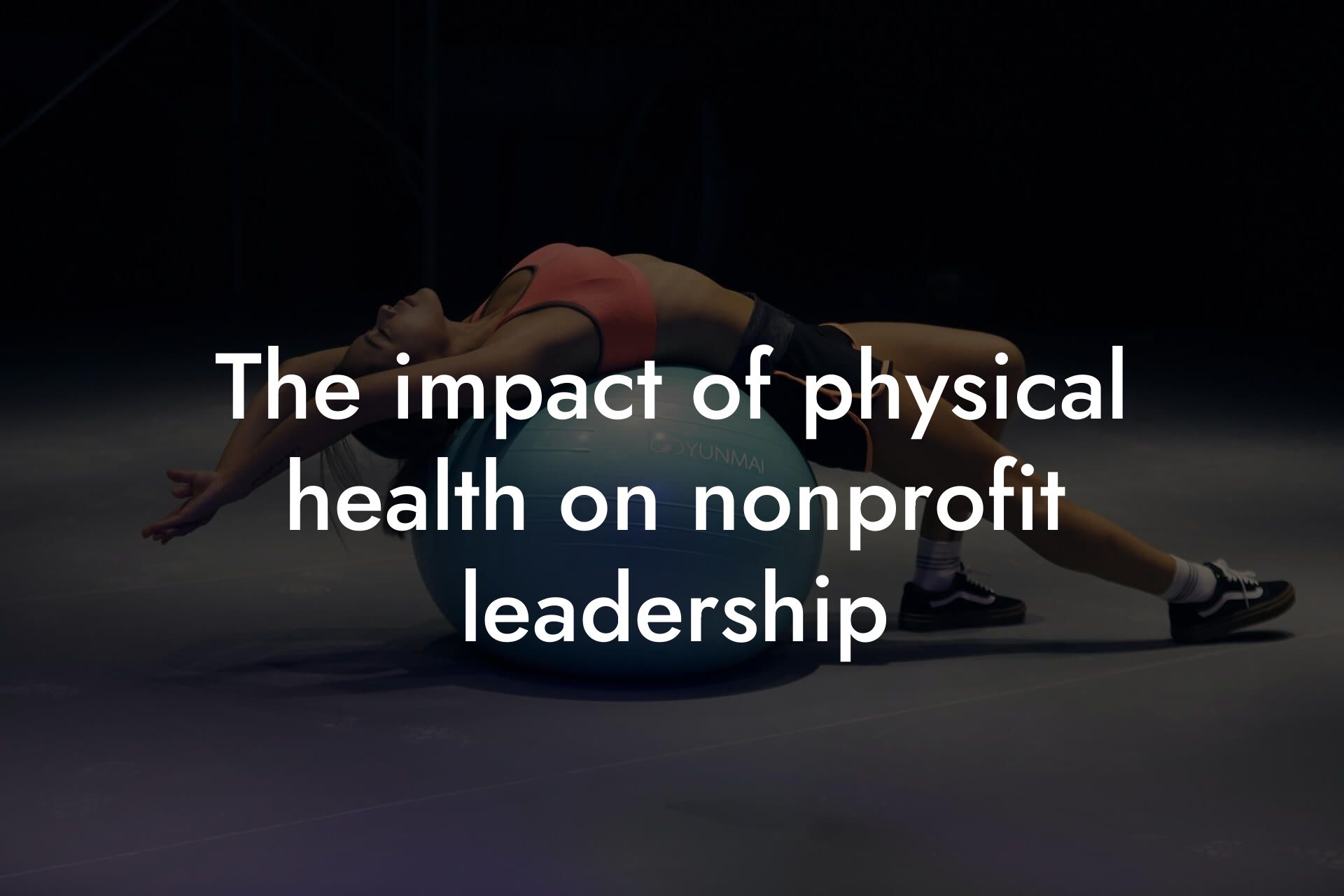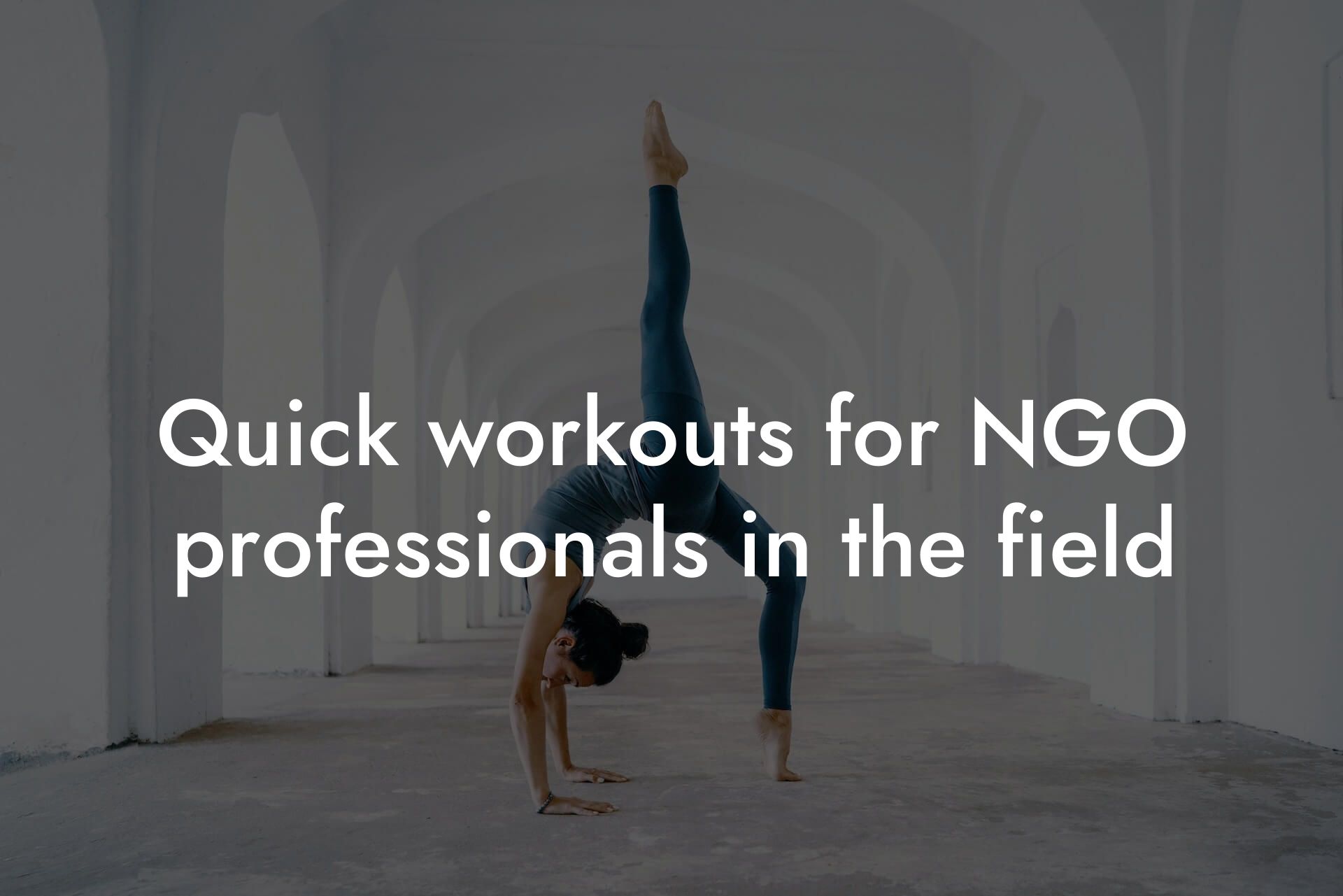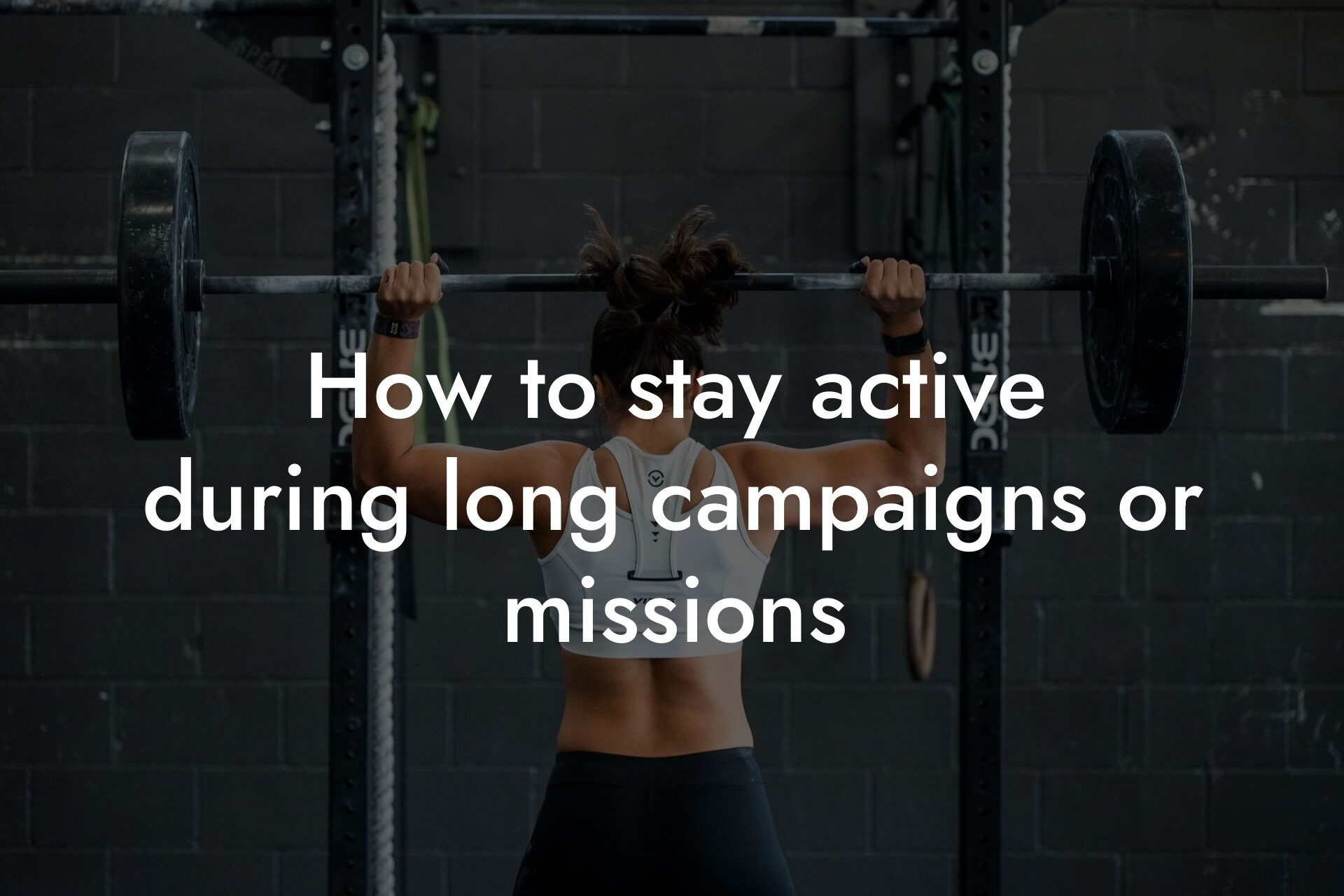As high-earning professionals, it's no secret that fitness plays a crucial role in our overall well-being and success. But did you know that fitness can also have a profound impact on the nonprofit sector? In this article, we'll explore the connection between fitness and nonprofit impact, and how you can use your passion for fitness to make a difference in your community.
Table of Contents
- The Benefits of Fitness for Nonprofit Professionals
- How Fitness Can Support Nonprofit Fundraising
- The Role of Fitness in Nonprofit Leadership
- The Connection Between Fitness and Philanthropy
- How Tano Performance Group Can Support Your Nonprofit Impact
- Case Studies: Fitness and Nonprofit Impact in Action
- Conclusion: The Power of Fitness in Driving Nonprofit Impact
- Frequently Asked Questions
The Benefits of Fitness for Nonprofit Professionals
Working in the nonprofit sector can be physically and emotionally demanding. Long hours, high stress levels, and limited resources can take a toll on your physical and mental health. However, incorporating fitness into your daily routine can have numerous benefits for nonprofit professionals. Regular exercise has been shown to improve energy levels, reduce stress, and increase productivity – all essential for success in the nonprofit sector.
Furthermore, fitness can also improve your mental clarity and focus, allowing you to approach challenges with a clear and level head. This is particularly important in the nonprofit sector, where complex problems require creative and innovative solutions. By prioritizing fitness, you can become a more effective and efficient nonprofit professional, ultimately leading to greater impact in your community.
How Fitness Can Support Nonprofit Fundraising
One of the most significant ways that fitness can support nonprofit impact is through fundraising. Charity runs, cycling events, and fitness challenges have become increasingly popular ways for nonprofits to raise money and awareness for their causes. By participating in these events, you can help raise vital funds for your favorite nonprofit organizations, while also improving your own physical health.
In addition, fitness events can also provide a unique opportunity for nonprofits to engage with their supporters and build a sense of community. By hosting fitness events, nonprofits can bring people together, build relationships, and foster a sense of camaraderie – all essential for building a strong and dedicated community of supporters.
The Role of Fitness in Nonprofit Leadership
As a nonprofit leader, your physical and mental health can have a direct impact on your organization's success. By prioritizing fitness, you can set a positive example for your team, increase your energy and motivation, and make more informed decisions. This, in turn, can lead to greater impact and success for your organization.
Furthermore, fitness can also play a critical role in building resilience and coping with stress. As a nonprofit leader, you may face numerous challenges and setbacks, from funding cuts to staff turnover. By incorporating fitness into your daily routine, you can build your resilience and better cope with these challenges, ultimately leading to greater success and impact for your organization.
The Connection Between Fitness and Philanthropy
Philanthropy and fitness may seem like unrelated concepts, but they are, in fact, closely linked. Many philanthropists and donors are drawn to fitness and wellness initiatives, recognizing the importance of physical health in achieving overall well-being. By supporting fitness initiatives, philanthropists can help promote healthy lifestyles, reduce healthcare costs, and improve overall quality of life.
In addition, fitness can also play a critical role in promoting social change and addressing social injustices. For example, fitness programs can be used to promote physical activity and healthy lifestyles in underserved communities, helping to address health disparities and promote greater equity.
How Tano Performance Group Can Support Your Nonprofit Impact
At Tano Performance Group, we're committed to helping high-earning professionals like you achieve their fitness goals and make a positive impact in their communities. Our state-of-the-art DEXA machine provides a comprehensive body assessment, giving you the information you need to optimize your fitness routine and achieve your goals.
By partnering with us, you can gain a deeper understanding of your body composition, bone density, and overall physical health. This information can be used to inform your fitness routine, helping you to achieve greater results and make a more significant impact in your community.
Case Studies: Fitness and Nonprofit Impact in Action
So, what does the connection between fitness and nonprofit impact look like in practice? Let's take a look at a few case studies that demonstrate the power of fitness in driving nonprofit success.
For example, the nonprofit organization, Girls on the Run, uses fitness to empower young girls and promote healthy lifestyles. Through their programs, girls learn to run, build confidence, and develop a positive body image. This, in turn, helps to promote greater self-esteem, academic achievement, and overall well-being.
Another example is the organization, Back on My Feet, which uses running to combat homelessness. By providing running programs and support, Back on My Feet helps individuals experiencing homelessness to build confidence, develop a sense of community, and achieve greater stability in their lives.
Conclusion: The Power of Fitness in Driving Nonprofit Impact
In conclusion, the connection between fitness and nonprofit impact is a powerful one. By prioritizing fitness, nonprofit professionals can improve their physical and mental health, increase their productivity and effectiveness, and drive greater impact in their communities. Furthermore, fitness can also be used to support nonprofit fundraising, leadership, and philanthropy, ultimately leading to greater success and impact for nonprofit organizations.
At Tano Performance Group, we're committed to helping you achieve your fitness goals and make a positive impact in your community. By partnering with us, you can gain a deeper understanding of your body composition, optimize your fitness routine, and drive greater nonprofit impact. So why wait? Take the first step today and discover the power of fitness in driving nonprofit success.
Frequently Asked Questions
What is the connection between fitness and nonprofit impact?
The connection between fitness and nonprofit impact lies in the fact that regular exercise and a healthy lifestyle can increase energy levels, improve mental clarity, and boost overall well-being, allowing individuals to be more productive and effective in their philanthropic efforts. Furthermore, a strong physical foundation can also enhance one's ability to cope with stress, a common challenge faced by many nonprofit professionals.
How can fitness improve my ability to make a positive impact in the nonprofit sector?
By incorporating regular exercise into your routine, you can experience improved focus, increased creativity, and enhanced problem-solving skills, all of which are essential for driving meaningful change in the nonprofit sector. Additionally, a healthy lifestyle can also lead to better time management, allowing you to prioritize tasks more effectively and make a greater impact in your community.
What are some common challenges faced by nonprofit professionals, and how can fitness help?
Nonprofit professionals often face high levels of stress, burnout, and emotional exhaustion, which can negatively impact their ability to make a positive difference. Regular exercise can help mitigate these challenges by reducing stress, improving mood, and increasing energy levels, allowing individuals to approach their work with renewed passion and dedication.
How can I balance my fitness goals with my demanding nonprofit work schedule?
It's essential to prioritize self-care and make time for exercise, even with a busy schedule. Consider incorporating short, high-intensity workouts into your daily routine, or schedule longer exercise sessions during the weekends. Additionally, many gyms and fitness studios offer flexible scheduling options, including early morning or lunchtime classes, to accommodate busy professionals.
What are some simple exercises I can do at my desk to stay active during the workday?
There are several exercises you can do at your desk to stay active, including chair squats, desk push-ups, leg raises, and wrist extensions. You can also try taking short breaks to stretch, jump up and down, or do a few jumping jacks to get your blood flowing.
How can I stay motivated to exercise when I'm not seeing immediate results?
It's essential to focus on progress, not perfection. Celebrate small victories, such as increasing your water intake or taking a certain number of steps each day. Additionally, find a workout buddy or accountability partner to help keep you motivated, and remind yourself of your why – the reasons you started exercising in the first place.
What are some common myths about exercise and fitness that nonprofit professionals should be aware of?
One common myth is that you need to spend hours at the gym to see results. However, even short bursts of exercise can be beneficial. Another myth is that exercise needs to be intense to be effective, when in fact, low-impact activities like yoga or walking can also have a significant impact on overall health and well-being.
How can I incorporate mindfulness into my fitness routine to reduce stress and increase focus?
Mindfulness can be incorporated into your fitness routine through activities like yoga, meditation, or deep breathing exercises. You can also try focusing on your breath or the sensations in your body during exercise, rather than distractions like music or TV. This can help you stay present and centered, even in the midst of a challenging workout.
What are some healthy snacks that can help fuel my workouts and support my nonprofit work?
Healthy snack options include nuts, seeds, fruits, and vegetables, as well as energy bars or protein shakes. Aim for snacks that are high in protein and fiber, and low in added sugars and unhealthy fats. Additionally, consider meal prepping or packing healthy snacks in advance to save time and energy.
How can I use my fitness journey to inspire others and make a greater impact in my community?
Share your fitness journey on social media, or consider leading a fitness class or workshop in your community. You can also use your fitness platform to raise awareness and funds for a specific nonprofit or cause that you're passionate about, inspiring others to get involved and make a difference.
What are some common fitness mistakes that nonprofit professionals should avoid?
Common fitness mistakes include overexerting oneself, failing to warm up or cool down, and neglecting proper form and technique. It's essential to listen to your body, start slowly, and prioritize proper form and technique to avoid injury and ensure long-term progress.
How can I prioritize self-care and fitness when working in a high-stress nonprofit environment?
Prioritize self-care by scheduling time for exercise and relaxation, just as you would any other important task. Additionally, consider incorporating stress-reducing activities like meditation or deep breathing into your daily routine, and don't be afraid to take breaks or ask for help when needed.
What are some ways that fitness can improve my overall well-being and resilience?
Fitness can improve overall well-being and resilience by reducing stress and anxiety, improving mood, and increasing energy levels. Regular exercise can also enhance sleep quality, boost self-confidence, and provide a sense of accomplishment and pride.
How can I use fitness to build connections and community in the nonprofit sector?
Consider organizing group fitness classes or workout events for nonprofit professionals, or participating in charity runs or fitness fundraisers. You can also use social media to connect with like-minded individuals and build a community around fitness and philanthropy.
What are some fitness apps or tools that can help nonprofit professionals stay on track and motivated?
Popular fitness apps and tools include MyFitnessPal, Strava, and Fitbit. These resources can help track progress, provide accountability, and offer workout inspiration and guidance.
How can I balance my fitness goals with other aspects of my life, such as work and family responsibilities?
Prioritize your goals and schedule accordingly, making time for exercise and self-care. Consider enlisting the support of family members or friends to help with childcare or household responsibilities, and don't be afraid to adjust your fitness goals as needed to accommodate changing circumstances.
What are some ways that fitness can improve my productivity and time management skills?
Regular exercise can improve focus, concentration, and mental clarity, allowing you to prioritize tasks more effectively and manage your time more efficiently. Additionally, the sense of accomplishment and pride that comes from achieving fitness goals can translate to other areas of life, including work and personal responsibilities.
How can I stay accountable and motivated on my fitness journey, especially during challenging times?
Find a workout buddy or accountability partner, and consider setting specific, measurable goals for yourself. Celebrate small victories and don't be too hard on yourself when faced with setbacks – instead, focus on progress and stay committed to your why.
What are some common misconceptions about fitness and exercise that nonprofit professionals should be aware of?
One common misconception is that exercise needs to be intense or extreme to be effective. However, low-impact activities like yoga or walking can also have a significant impact on overall health and well-being. Another misconception is that fitness is only for young, able-bodied individuals – in reality, exercise can be adapted to suit any age or ability level.
How can I use my fitness journey to inspire and empower others, particularly in underserved communities?
Share your fitness journey with others, and consider leading fitness classes or workshops in underserved communities. You can also use your fitness platform to raise awareness and funds for specific causes or organizations that support these communities, inspiring others to get involved and make a difference.
What are some ways that fitness can improve my overall mental health and well-being?
Fitness can improve overall mental health and well-being by reducing stress and anxiety, improving mood, and increasing self-confidence. Regular exercise can also enhance sleep quality, reduce symptoms of depression, and provide a sense of accomplishment and pride.
How can I incorporate fitness into my daily routine, even with a busy schedule?
Incorporate short, high-intensity workouts into your daily routine, or schedule longer exercise sessions during the weekends. Additionally, consider incorporating physical activity into your daily commute, such as walking or biking to work.
What are some fitness resources or tools that are specifically tailored to nonprofit professionals?
There are several fitness resources and tools specifically tailored to nonprofit professionals, including fitness apps and websites that cater to busy professionals, as well as workout classes and studios that offer discounted rates for nonprofit employees.
How can I use fitness to build resilience and coping skills in the face of adversity?
Fitness can help build resilience and coping skills by providing a healthy outlet for stress and emotions, improving mood and overall well-being, and increasing self-confidence and self-efficacy. Regular exercise can also enhance problem-solving skills and provide a sense of control and empowerment.
Here are some related articles you might love...
- The impact of physical health on nonprofit leadership
- Quick workouts for NGO professionals in the field
- How to stay active during long campaigns or missions
- The role of physical health in effective advocacy
- Balancing mission-driven work with personal fitness
- How DEXA scans can benefit nonprofit professionals
- Nutrition tips for maintaining energy during fundraising events
- How nonprofit workers can stay fit during demanding schedules
- Managing stress through physical fitness in nonprofit roles
Zak Faulkner
Zak Faulkner is a leading authority in the realm of physical health and body composition analysis, with over 15 years of experience helping professionals optimise their fitness and well-being. As one the experts behind Tano Performance Group, Zak has dedicated his career to providing in-depth, science-backed insights that empower clients to elevate their physical performance and overall health.
With extensive knowledge of DEXA technology, Zak specializes in delivering comprehensive body assessments that offer precise data on body fat, muscle mass, bone density, and overall physique. His expertise enables individuals to make informed decisions and achieve their fitness goals with accuracy and confidence. Zak’s approach is rooted in a deep understanding of human physiology, combined with a passion for helping clients unlock their full potential through personalised strategies.
Over the years, Zak has earned a reputation for his commitment to excellence, precision, and client-focused service. His guidance is trusted by top professionals who demand the best when it comes to their health. Whether advising on fitness programs, nutritional strategies, or long-term wellness plans, Zak Faulkner’s insights are a valuable resource for anyone serious about taking their health and fitness to the next level.
At Tano Performance Group, Zak continues to lead our Content Team revolutionising how professionals approach their physical health, offering unparalleled expertise that drives real results.




